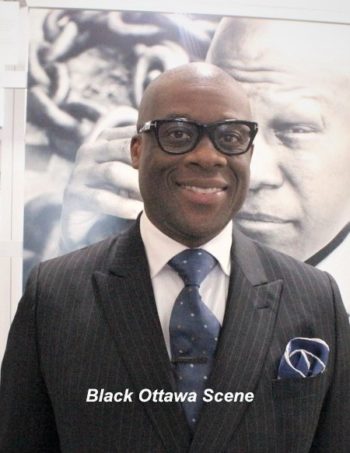Ontario faces $3.4 million bill in second failed prosecution of Black judge over his Black advocacy
By Betsy Powell Courts Reporter
Thu., July 29, 2021

Photo copyright Black Ottawa Scene
Ontario taxpayers are facing a $3.4 million legal tab in the latest disciplinary case against judge Donald McLeod over his advocacy work on behalf of Black Canadians.
But even that figure doesn’t capture the full cost of two separate Ontario Judicial Council proceedings that twice cleared the Brampton judge of misconduct while finding some aspects of his conduct “incompatible with judicial office.”
McLeod, who could have been fired, was cleared to return to work after the hearing panel ultimately dismissed a 2019 complaint last month. He had been on paid suspension since August 2019, with an annual salary of about $300,000.
The $3.4 million legal bill includes more than $2 million billed by the lawyers retained by the OJC to present the case and more than $1 million for his defence. It does not include compensation paid to the four-member hearing panel, which includes two senior judges, a lawyer and civilian member; pay for OJC staff; the cost of the investigation conducted by an outside law firm; nor the use of the facility that hosted the virtual portion of the proceedings.
It also does not include the cost of the first OJC hearing over McLeod’s advocacy in 2018. McLeod was compensated for an $81,000 legal bill following that hearing, which was also dismissed.
Both proceedings arose from complaints about McLeod’s involvement in the Federation of Black Canadians, an organization he helped found dedicated to promoting equality for persons of African descent. The issues at the first hearing related to him initiating meetings with politicians and advocating for specific policy changes. More serious allegations arose the second time, when McLeod was accused of lying to the first panel about his involvement in a child deportation case.
On Thursday, the OJC posted the second panel’s reasons for recommending the attorney general compensate McLeod for his legal costs, as required under the Courts of Justice Act when a complaint is dismissed.
McLeod’s legal team included Toronto lawyers Frank Addario, Sheila Block and Faisal Mirza, who submitted a bill totalling almost $1.1 million, including disbursements and HST — a total the hearing panel described as “substantial.”
“We have found no precedent for a recommendation for compensation of this magnitude in other Ontario Judicial Council or Justice of the Peace Review Council cases,” wrote the OJC panel chaired by Justice Janet Simmons of the Ontario Court of Appeal.
“By the same token, we have found no case of similar length and document volume in which compensation has been mandatory.”
McLeod’s legal tab was less than half the nearly $2.3 million bill submitted by “presenting counsel,” the lawyers retained by the OJC.
According to the OJC website, presenting counsel are considered independent and not mandated to seek a “particular disposition.” Their role is “to ensure that the complaint against the judge is evaluated fairly and dispassionately so as to achieve a just result and preserve or restore confidence in the judiciary.”
In her closing arguments on behalf of McLeod, defence lawyer Block suggested the proceedings had unfolded like a criminal trial and said that the allegations were not properly investigated at the outset.
In its reasons for awarding compensation, the OJC panel made clear they were not being critical of McLeod nor his lawyers, who “were required to respond to the case put against him,” which demanded “the significant time spent.”
The panel noted the most serious charge against McLeod was perjury, “the equivalent of a capital offence” against a judge.
Public hearings carried live on YouTube were held over 17 days last winter and included the testimony of 13 witnesses, including McLeod. Lawyers also delivered oral and written submissions. An agreed statement of facts filed at the hearing comprised 2,017 pages and a 639-page joint document brief was filed, the panel noted.
A spokeswoman with the OJC previously told the Star there was no precedent to release the total amount of legal fees in both hearings, including the amount paid to presenting counsel. The hearing panel included them in their costs decision posted Thursday after McLeod’s lawyers requested they be disclosed to ensure their own fees could be seen as “reasonable” in context.
The OJC’s presenting counsel calculated their fees on the basis of two lead counsel billing at $450 an hour, one senior counsel billing at $350 an hour, one intermediate counsel billing at $275 an hour and one junior lawyer billing at $175 an hour, for total fees of $1.97 million, with taxable disbursements and HST pushing the total to $2.3 million. Those fees align with the OJC’s guidelines on the maximum hourly rates that may be charged by presenting counsel.
Those lawyers, Guy Pratte, Nadia Effendi, Christine Muir, Veronica Sjolin and Mannu Chowdhury, belong to Borden Ladner Gervais, a firm with more than 750 lawyers across Canada.
During his closing arguments, Pratte, who is senior counsel at BLG, said it was in the public interest to explore the allegations thoroughly, noting: “if we hadn’t done it we would have been accused of doing an incomplete job.”
In its legal costs decision, the panel wrote that the McLeod case involved important issues that were significant not only to him but to the administration of justice and the public at large.
“The issues included allegations that Justice McLeod perjured himself or misled the Hearing Panel at a prior hearing. The importance of a full public airing of such significant allegations cannot be overstated,” the panel stated.
“Whatever the outcome, absent a full public hearing into such serious allegations, public confidence in the administration of justice would inevitably suffer. It is no doubt for that reason that Presenting Counsel presented the allegations in a meticulous manner, with voluminous documentation and submissions.”
Source: Toronto Star
